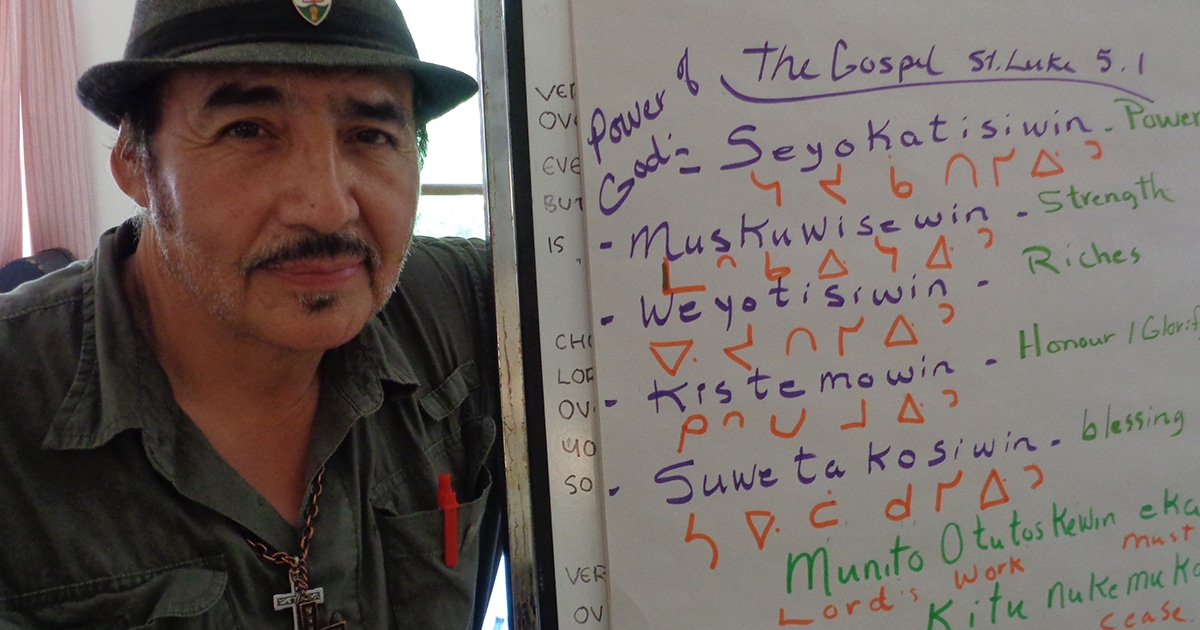For 22 Days, the Anglican Church of Canada is calling people to learn, pray, and act for the Anglican Healing Fund, and its support for the recovery of Indigenous languages. 22 Days for Healing and Reconciliation start on May 31 and lead up to the National Aboriginal Day of Prayer on June 21.
This year represents the second occurrence of the 22 Days project, which the church first observed in 2015 to mark the 22 days between the closing ceremonies of the Truth and Reconciliation Commission (TRC) and National Aboriginal Day. Anglicans observed those first 22 days by ringing church bells across the country to draw attention to missing and murdered Indigenous women and girls.
In 2017, Anglicans are encouraged to mark 22 Days by learning about the Healing Fund and its role in bolstering community-based projects to preserve Indigenous languages; praying for those who seek healing through language recovery; and acting to support the Healing Fund through prayer and donations.
The focus on the Healing Fund and language recovery—both for 22 Days and the annual fundraising campaign Giving With Grace—reflects the crucial role of language as a pillar of Indigenous culture and identity, as the church strives to live out the 94 Calls to Action identified by the TRC.
“When you don’t know your language, you lose your identity,” Healing Fund Coordinator Esther Wesley said.
“When I look at the Healing Fund, and the [Indian Residential Schools] Settlement Agreement coming to an end, I talk to a number of people, including a number of elders from different communities, [about] what they would like to see and what they would value more than anything, and that’s language.”
Over the last 25 years, the Healing Fund has worked on community projects with an estimated 700 different groups across Canada. Since Wesley began her work in 2004, she has observed an evolution in how residential school survivors and their families have grappled with the process of healing from the intergenerational impact of the schools.
The 1990s saw the first community gatherings where survivors began speaking about emotional, physical, and sexual abuse they had endured in residential schools. Later, they attended school reunions with classmates.
During that time, Wesley said, both Indigenous and non-Indigenous churches rarely discussed or mentioned cultural values.
“Over time, it has changed,” she said. “You see more and more communities starting to talk about their traditional values, their traditional practices. You see this sort of climbing of a ladder—people coming back to their traditional ways of understanding, their traditional practices and their spiritual beliefs, coming onboard as time goes on.”
With the growing prevalence of projects based on cultural practices in the wake of the TRC, Wesley hoped that this year’s 22 Days would make people more aware of language loss across Canada.
“There are some strong languages, and there are some languages in some areas that have less than 10 speakers, and that’s where we need to make sure people understand that languages are going fast … and if we don’t help to do anything about it, they’re going to be lost. Many of them are already lost.”
National Indigenous Anglican Bishop Mark MacDonald described the focus on language recovery as “something that Indigenous people have been asking for, hungry for, waiting for, for a long time.”
“This is a critical issue for Indigenous people,” Bishop MacDonald said. “Recovery and revitalization of language is really central to what a livable future will be.”
“Studies have shown that retention of language, the strength of language, has a lot to say about the resilience of people,” he added. “And so the strength of language often is an indication of the strength of a community.”
Archbishop Fred Hiltz, Primate of the Anglican Church of Canada, noted that this year’s 22 Days coincides with the appointment of Melanie Delva as reconciliation animator, as well as the day of Pentecost—the same day on which, in the Acts of the Apostles, a crowd comes together with each person hearing the Good News in their own language.
“I think people are more conscious than ever of the importance of recovering of language … so I think this has the potential to really, really ignite a lot of interest and commitment from people,” the Primate said.
He expressed his hope that the 22 Days would become a standing commitment for the Anglican Church of Canada well into the future.
“I would say it’s really quite a lovely development that the 22 Days has become something of a pattern in the life of our church … I think it’s really good that that’s become a feature of our church’s continuing commitment to reconciliation.”
View a list of resources to observe this year’s 22 Days. Sign up for the event on Facebook at www.facebook.com/canadiananglican.
Interested in keeping up-to-date on news, opinion, events and resources from the Anglican Church of Canada? Sign up for our email alerts .

